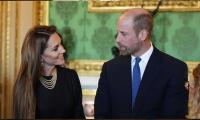SHC seeks details of tax collected from and spent on Karachi
The Sindh High Court (SHC) on Monday directed the Federal Board of Revenue (FBR), and federal and provincial law officers to submit reports showing figures of the federal and provincial taxes collected from Karachi during last three years.
The high court also asked the authorities how much portion of that tax had been utilised for the development of Karachi. The direction came on a lawsuit filed by Mohammad Rameez Khan and others against what they said non-transparent use of Rs3.6 billion World Bank-funded Competitive and Livable City of Karachi (CLICK) project.
The SHC directed an additional advocate general to file a precise report under his statement containing details of how much sales tax on services and other provincial taxes had been collected from the city of Karachi during the last three years and to what extent it was expended.
The high court also issued a notice to the FBR chairman and deputy attorney general to submit a precise statement showing the figures of federal taxes collected from the city of Karachi during the past three years and the portion of them utilised for the development of Karachi.
The SHC directed the federal and provincial law officers, and FBR to submit their reports in a tabular form. It said that the reports should also contain figures in US dollars. A single bench of the high court headed by Justice Mohammad Faisal Kamal Alam observed that the matter pertained to the well-being of city of Karachi.
The high court also turned down an application of some plaintiffs who wanted to withdraw the lawsuit, observing that all these matters clearly fell within the ambit of public interest litigation and could not be allowed to be withdrawn as requested.
The SHC observed that certain questions were to be answered in these matters, due to which the applications for withdrawal of those suits could not be granted. The bench also issued a notice to the Sindh High Court Bar Association president for the next date of hearing to assist the court.
The counsel of all the plaintiffs, except one, stated that they wanted to withdraw the suits and cited a DHA case in support of their arguments. To this, the bench observed that the reported judgment was about a dispute regarding a parking area and stopping of an illegal construction within the jurisdiction of the Defence Housing Authority and subsequently the respondent in an appeal said it wanted withdrawal of the suit, but the request was declined. However, later that order was set aside by a division bench of the high court.
The SHC observed that facts and controversy of the reported decision were clearly distinguishable from those involved in the present suits. It observed that the Supreme Court had handed down a judgment holding that it was not an absolute right of the plaintiff to withdraw a claim, but the same was subject to certain limitations, in particular, where a right of a third party had been accrued. Consequently, in appropriate cases the request for withdrawal could be declined where it was seen to prevent the court from passing an order.
Some citizens had filed lawsuits pertaining to what they claimed non-transparent use of the World Bank’s funds amounting to Rs3.6 billion for the CLICK project. The plaintiffs had submitted that the Sindh government had initiated the World Bank-funded CLICK project was aimed at improving the urban management, service delivery and business environment in Karachi.
They submitted that the project had no attachment with the Karachi Metropolitan Corporation (KMC), which had to award its projects independently after observing the local laws, including but not limited to the Sindh Public Procurement Act and its Rules so also Procurement Regulations 5.32.
They submitted that a false project under the name of emergency road repair work had also been conceived by the KMC whereby Rs3.6 billion had been awarded to various contractors. They submitted that no step in accordance with the procurement law was taken by the KMC and the contracts were awarded directly to the blue-eyed companies without any advertisement depriving the plaintiffs from participation in the open-bidding process, which might have saved the public money and also enhanced the quality of work.
The plaintiffs submitted that since funds were provided by the World Bank in terms of regulation which asked for its utilisation by the borrowing entity a transparent mechanism that included an advertisement at least.
The high court was requested to declare all the contracts awarded by the Sindh government in violation of procurement rules as unlawful and restrain it from awarding further contracts through direct contracting in violation of the Section 17 of the Sindh Public Procurement Act, 2009 and rules made thereunder.
-
 2026 Golden Globes: Nikki Glaser Mocks Leonardo DiCaprio's Notorious Dating Habits
2026 Golden Globes: Nikki Glaser Mocks Leonardo DiCaprio's Notorious Dating Habits -
 Prince Harry 'loved' Seeing Charles, Eyes More Meetings With King: Source
Prince Harry 'loved' Seeing Charles, Eyes More Meetings With King: Source -
 Chad Michael Murray Admits 2000s Fame Could Have 'destroyed' Him
Chad Michael Murray Admits 2000s Fame Could Have 'destroyed' Him -
 Emma Stone Reflects On Diane Keaton's 'most Valuable' Lesson
Emma Stone Reflects On Diane Keaton's 'most Valuable' Lesson -
 Kanye West Once Paid $1 Million Per Day To Record Album: Here's Why
Kanye West Once Paid $1 Million Per Day To Record Album: Here's Why -
 Prince Harry Hopes To Show Archie, Lilibet Where He 'grew Up'
Prince Harry Hopes To Show Archie, Lilibet Where He 'grew Up' -
 Jacob Elordi Names Childhood Crushes Including A Major 60s Star
Jacob Elordi Names Childhood Crushes Including A Major 60s Star -
 Kristin Davis Dicusses Fate Of Her Sex And The City Character
Kristin Davis Dicusses Fate Of Her Sex And The City Character -
 Noah Wyle Gushes Over 30-year Bond With George Clooney: 'Real Touchstone'
Noah Wyle Gushes Over 30-year Bond With George Clooney: 'Real Touchstone' -
 Zara Larsson Steps Up Criticism Against 'evil' Policies
Zara Larsson Steps Up Criticism Against 'evil' Policies -
 Adam Sandler Jokes About Aging As He Accepts Career Honour
Adam Sandler Jokes About Aging As He Accepts Career Honour -
 Royal Stalker Cases Increase Following Harry, Meghan's Marriage: Report
Royal Stalker Cases Increase Following Harry, Meghan's Marriage: Report -
 Sarah Ferguson Eyes Princess Diana’s Private Letters In Bid To Secure Future
Sarah Ferguson Eyes Princess Diana’s Private Letters In Bid To Secure Future -
 Andrew Plots Secret Sales Of Royal Jewels Amid Royal Lodge Eviction
Andrew Plots Secret Sales Of Royal Jewels Amid Royal Lodge Eviction -
 Abbott Elementary Star Chris Perfetti Hints At What To Expect From Season 5
Abbott Elementary Star Chris Perfetti Hints At What To Expect From Season 5 -
 Prince William Always Ready To Step Up: ‘He’s Barely Able To Contain His Fury When Kate’s Involved’
Prince William Always Ready To Step Up: ‘He’s Barely Able To Contain His Fury When Kate’s Involved’



